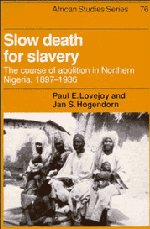Book contents
- Frontmatter
- Contents
- List of maps
- List of tables
- Preface
- 1 Slavery and the British conquest of Northern Nigeria
- 2 Fugitive slaves and the crisis in slavery policy
- 3 The debate on legal-status abolition
- 4 Emancipation and the law
- 5 Upholding proprietary rights to land
- 6 The role of taxation in the reform of slavery
- 7 The colonial economy and the slaves
- 8 The persistence of concubinage
- 9 Legal-status abolition: the final phase
- Appendix: Court records of slaves issued certificates of freedom
- Notes
- Glossary
- Bibliography
- Index
- Title in the series
5 - Upholding proprietary rights to land
Published online by Cambridge University Press: 03 May 2011
- Frontmatter
- Contents
- List of maps
- List of tables
- Preface
- 1 Slavery and the British conquest of Northern Nigeria
- 2 Fugitive slaves and the crisis in slavery policy
- 3 The debate on legal-status abolition
- 4 Emancipation and the law
- 5 Upholding proprietary rights to land
- 6 The role of taxation in the reform of slavery
- 7 The colonial economy and the slaves
- 8 The persistence of concubinage
- 9 Legal-status abolition: the final phase
- Appendix: Court records of slaves issued certificates of freedom
- Notes
- Glossary
- Bibliography
- Index
- Title in the series
Summary
The slavery policy instituted by Lugard and maintained by the British administration after his departure in 1906 was heavily dependent for its efficacy on colonial reforms of land tenure. Tenure policies were intended to be, and did in practice serve as, a major element affecting the decisions of both masters and agricultural slaves. Thus even though the institution of slavery was not abolished, economic forces as shaped by the land system worked to keep many slaves, especially males, in place while at the same time diminishing slavery as a viable institution. Policies on land tenure had only a marginal impact on the many women slaves who were not involved in agriculture. Since tenure matters were almost entirely focused on men, even those women slaves who lived in rural areas were only indirectly affected by colonial land policy.
The British regime more or less immediately used land policy to inhibit the wholesale defection of slaves. Even by 1903, it was clear that inability to gain access to land except that available from arrangements with masters was a primary element preventing slaves from deserting. On the one hand fugitive slaves were denied land wherever proprietary rights were clearly established, and that included most of the desirable areas of settlement. On the other hand, those slaves who stayed in place had to rent land or continue to farm their masters' lands in exchange for labor, a share of crops, and other obligations.
- Type
- Chapter
- Information
- Slow Death for SlaveryThe Course of Abolition in Northern Nigeria 1897–1936, pp. 127 - 158Publisher: Cambridge University PressPrint publication year: 1993

